Professional Identity and Nursing Practice Essay: NUR1202
VerifiedAdded on 2022/09/14
|9
|2188
|11
Essay
AI Summary
This essay delves into the critical concept of professional identity within the nursing profession, analyzing its significance through the lens of a provided case study. The assignment explores the application of therapeutic relationships, evidence-based care practices, and adherence to the NMBA Code of Conduct for Nurses (2018) and the Registered Nurse Standards for Practice (2016). The essay examines the consequences of a nurse's failure to uphold these standards, specifically focusing on the impact on patient care and the nurse's professional standing. It also discusses the roles and responsibilities of co-workers and supervisors in addressing professional misconduct, including the implementation of legal actions and the development of improved nursing practices through training and research. The analysis emphasizes the importance of ethical conduct, patient safety, and the continuous improvement of nursing practices to maintain and strengthen professional identity within the healthcare setting.
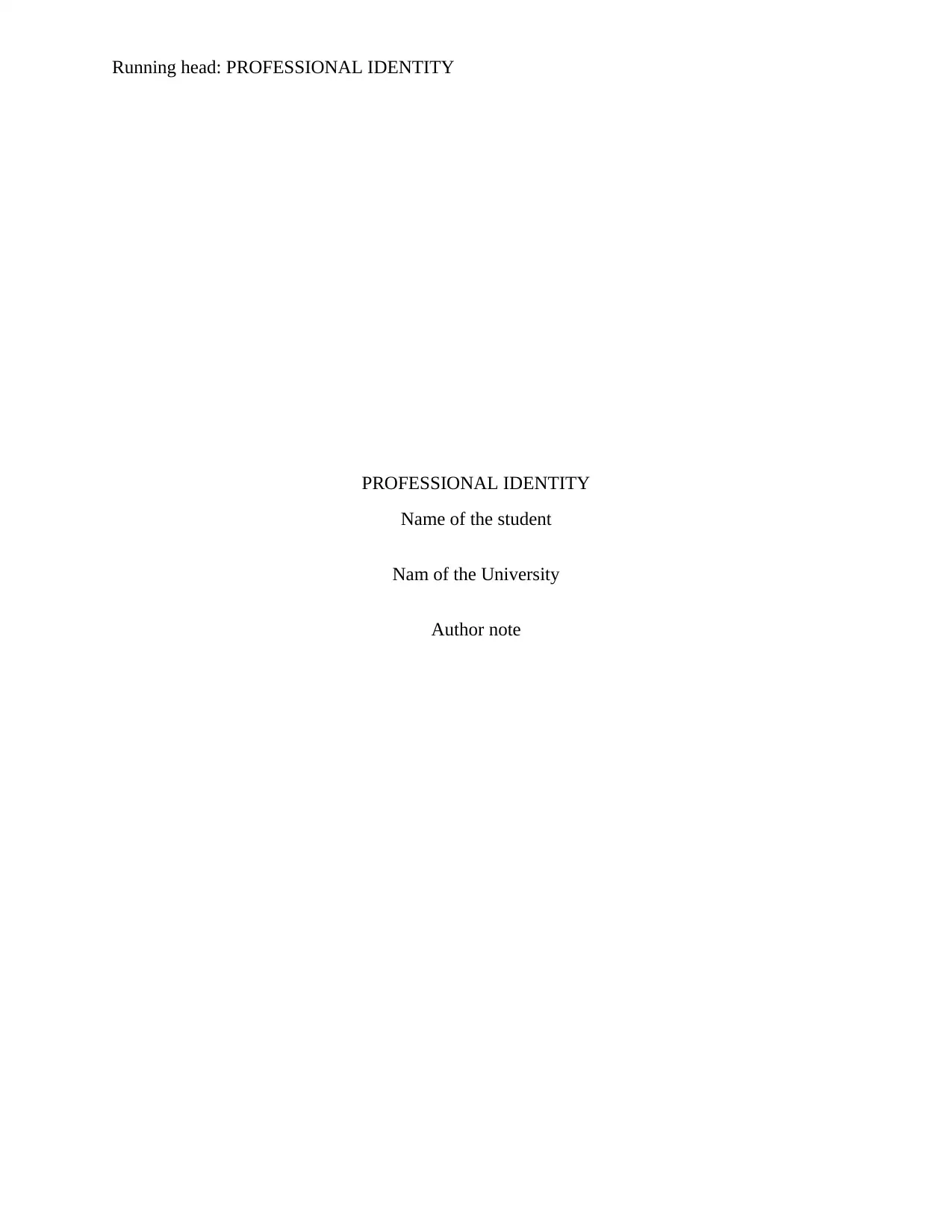
Running head: PROFESSIONAL IDENTITY
PROFESSIONAL IDENTITY
Name of the student
Nam of the University
Author note
PROFESSIONAL IDENTITY
Name of the student
Nam of the University
Author note
Paraphrase This Document
Need a fresh take? Get an instant paraphrase of this document with our AI Paraphraser
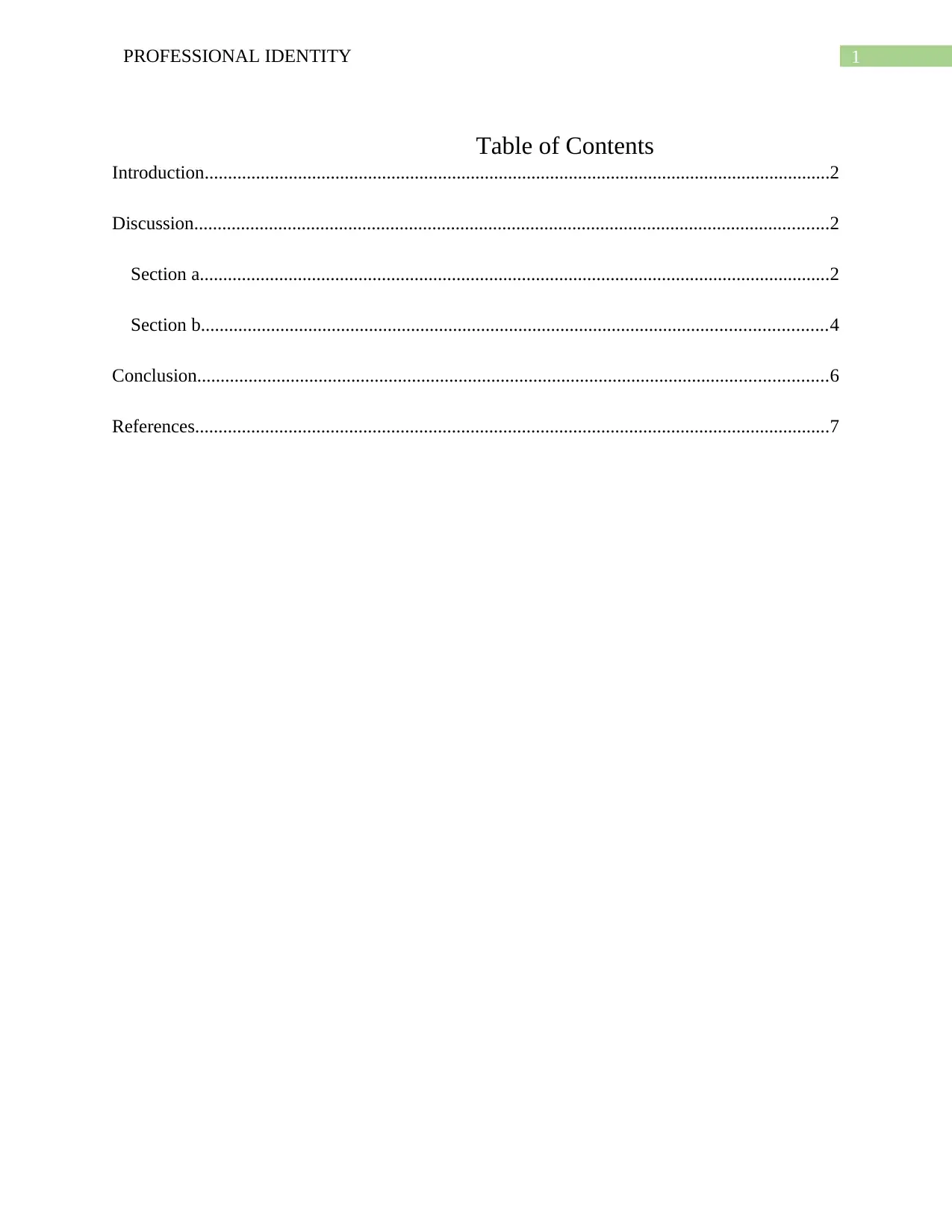
1PROFESSIONAL IDENTITY
Table of Contents
Introduction......................................................................................................................................2
Discussion........................................................................................................................................2
Section a.......................................................................................................................................2
Section b......................................................................................................................................4
Conclusion.......................................................................................................................................6
References........................................................................................................................................7
Table of Contents
Introduction......................................................................................................................................2
Discussion........................................................................................................................................2
Section a.......................................................................................................................................2
Section b......................................................................................................................................4
Conclusion.......................................................................................................................................6
References........................................................................................................................................7
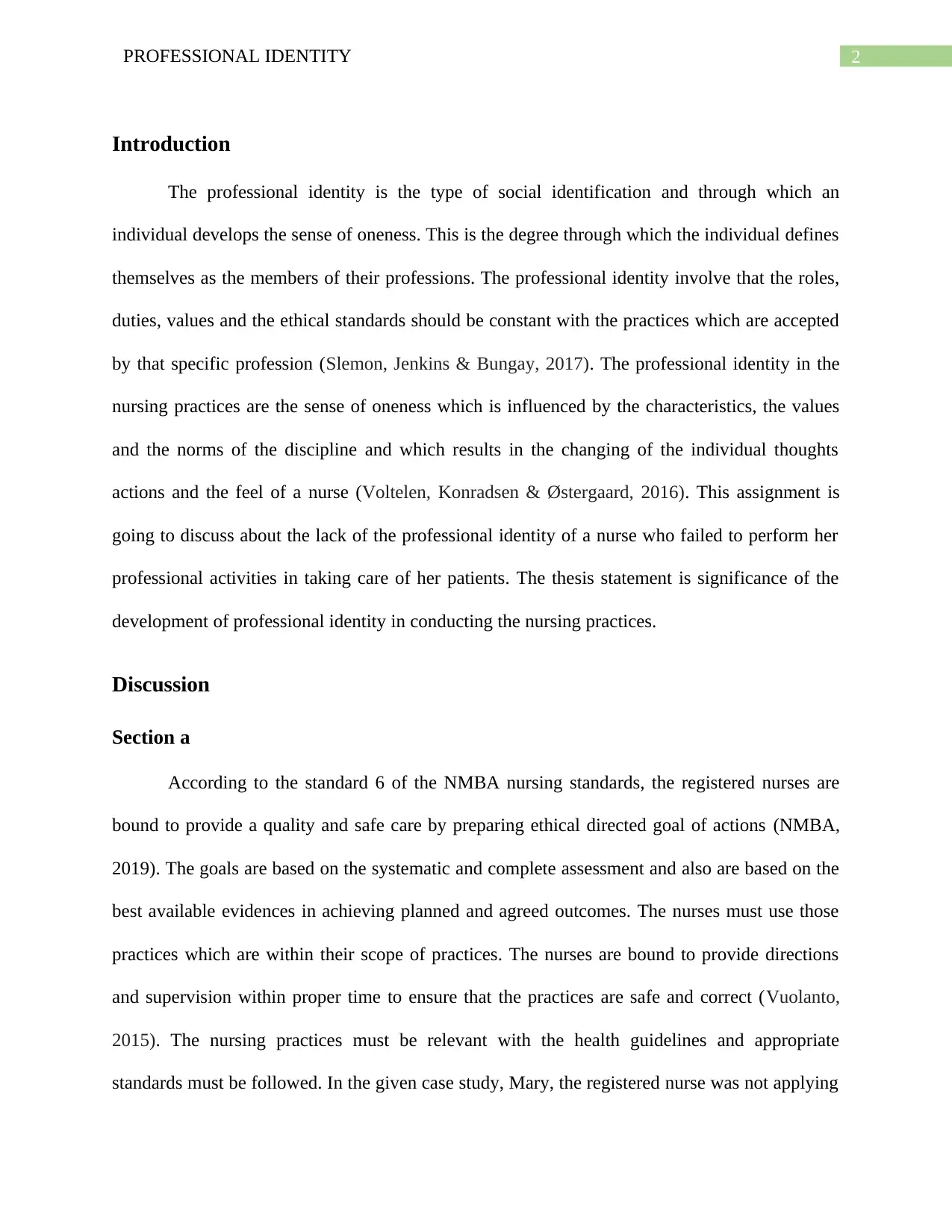
2PROFESSIONAL IDENTITY
Introduction
The professional identity is the type of social identification and through which an
individual develops the sense of oneness. This is the degree through which the individual defines
themselves as the members of their professions. The professional identity involve that the roles,
duties, values and the ethical standards should be constant with the practices which are accepted
by that specific profession (Slemon, Jenkins & Bungay, 2017). The professional identity in the
nursing practices are the sense of oneness which is influenced by the characteristics, the values
and the norms of the discipline and which results in the changing of the individual thoughts
actions and the feel of a nurse (Voltelen, Konradsen & Østergaard, 2016). This assignment is
going to discuss about the lack of the professional identity of a nurse who failed to perform her
professional activities in taking care of her patients. The thesis statement is significance of the
development of professional identity in conducting the nursing practices.
Discussion
Section a
According to the standard 6 of the NMBA nursing standards, the registered nurses are
bound to provide a quality and safe care by preparing ethical directed goal of actions (NMBA,
2019). The goals are based on the systematic and complete assessment and also are based on the
best available evidences in achieving planned and agreed outcomes. The nurses must use those
practices which are within their scope of practices. The nurses are bound to provide directions
and supervision within proper time to ensure that the practices are safe and correct (Vuolanto,
2015). The nursing practices must be relevant with the health guidelines and appropriate
standards must be followed. In the given case study, Mary, the registered nurse was not applying
Introduction
The professional identity is the type of social identification and through which an
individual develops the sense of oneness. This is the degree through which the individual defines
themselves as the members of their professions. The professional identity involve that the roles,
duties, values and the ethical standards should be constant with the practices which are accepted
by that specific profession (Slemon, Jenkins & Bungay, 2017). The professional identity in the
nursing practices are the sense of oneness which is influenced by the characteristics, the values
and the norms of the discipline and which results in the changing of the individual thoughts
actions and the feel of a nurse (Voltelen, Konradsen & Østergaard, 2016). This assignment is
going to discuss about the lack of the professional identity of a nurse who failed to perform her
professional activities in taking care of her patients. The thesis statement is significance of the
development of professional identity in conducting the nursing practices.
Discussion
Section a
According to the standard 6 of the NMBA nursing standards, the registered nurses are
bound to provide a quality and safe care by preparing ethical directed goal of actions (NMBA,
2019). The goals are based on the systematic and complete assessment and also are based on the
best available evidences in achieving planned and agreed outcomes. The nurses must use those
practices which are within their scope of practices. The nurses are bound to provide directions
and supervision within proper time to ensure that the practices are safe and correct (Vuolanto,
2015). The nursing practices must be relevant with the health guidelines and appropriate
standards must be followed. In the given case study, Mary, the registered nurse was not applying
⊘ This is a preview!⊘
Do you want full access?
Subscribe today to unlock all pages.

Trusted by 1+ million students worldwide
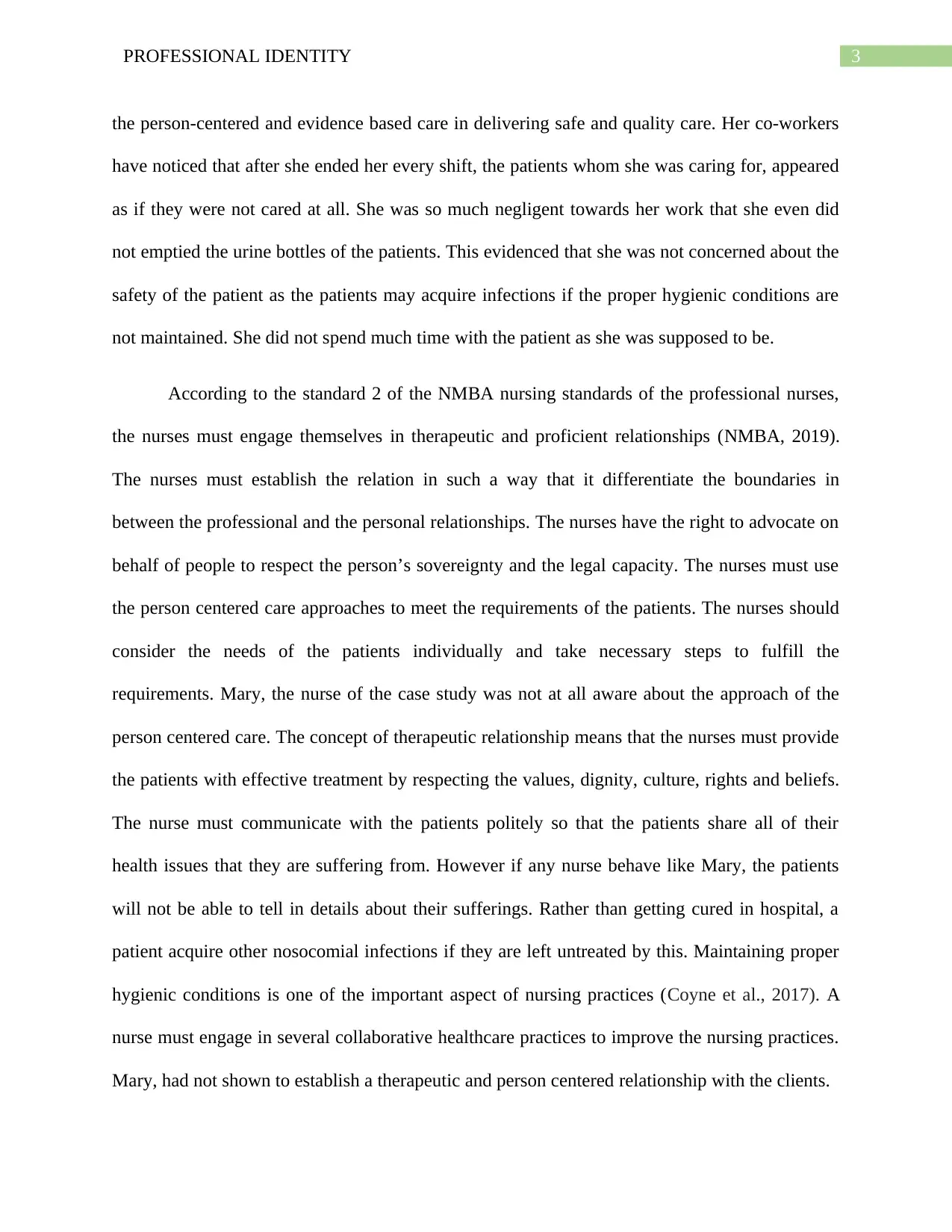
3PROFESSIONAL IDENTITY
the person-centered and evidence based care in delivering safe and quality care. Her co-workers
have noticed that after she ended her every shift, the patients whom she was caring for, appeared
as if they were not cared at all. She was so much negligent towards her work that she even did
not emptied the urine bottles of the patients. This evidenced that she was not concerned about the
safety of the patient as the patients may acquire infections if the proper hygienic conditions are
not maintained. She did not spend much time with the patient as she was supposed to be.
According to the standard 2 of the NMBA nursing standards of the professional nurses,
the nurses must engage themselves in therapeutic and proficient relationships (NMBA, 2019).
The nurses must establish the relation in such a way that it differentiate the boundaries in
between the professional and the personal relationships. The nurses have the right to advocate on
behalf of people to respect the person’s sovereignty and the legal capacity. The nurses must use
the person centered care approaches to meet the requirements of the patients. The nurses should
consider the needs of the patients individually and take necessary steps to fulfill the
requirements. Mary, the nurse of the case study was not at all aware about the approach of the
person centered care. The concept of therapeutic relationship means that the nurses must provide
the patients with effective treatment by respecting the values, dignity, culture, rights and beliefs.
The nurse must communicate with the patients politely so that the patients share all of their
health issues that they are suffering from. However if any nurse behave like Mary, the patients
will not be able to tell in details about their sufferings. Rather than getting cured in hospital, a
patient acquire other nosocomial infections if they are left untreated by this. Maintaining proper
hygienic conditions is one of the important aspect of nursing practices (Coyne et al., 2017). A
nurse must engage in several collaborative healthcare practices to improve the nursing practices.
Mary, had not shown to establish a therapeutic and person centered relationship with the clients.
the person-centered and evidence based care in delivering safe and quality care. Her co-workers
have noticed that after she ended her every shift, the patients whom she was caring for, appeared
as if they were not cared at all. She was so much negligent towards her work that she even did
not emptied the urine bottles of the patients. This evidenced that she was not concerned about the
safety of the patient as the patients may acquire infections if the proper hygienic conditions are
not maintained. She did not spend much time with the patient as she was supposed to be.
According to the standard 2 of the NMBA nursing standards of the professional nurses,
the nurses must engage themselves in therapeutic and proficient relationships (NMBA, 2019).
The nurses must establish the relation in such a way that it differentiate the boundaries in
between the professional and the personal relationships. The nurses have the right to advocate on
behalf of people to respect the person’s sovereignty and the legal capacity. The nurses must use
the person centered care approaches to meet the requirements of the patients. The nurses should
consider the needs of the patients individually and take necessary steps to fulfill the
requirements. Mary, the nurse of the case study was not at all aware about the approach of the
person centered care. The concept of therapeutic relationship means that the nurses must provide
the patients with effective treatment by respecting the values, dignity, culture, rights and beliefs.
The nurse must communicate with the patients politely so that the patients share all of their
health issues that they are suffering from. However if any nurse behave like Mary, the patients
will not be able to tell in details about their sufferings. Rather than getting cured in hospital, a
patient acquire other nosocomial infections if they are left untreated by this. Maintaining proper
hygienic conditions is one of the important aspect of nursing practices (Coyne et al., 2017). A
nurse must engage in several collaborative healthcare practices to improve the nursing practices.
Mary, had not shown to establish a therapeutic and person centered relationship with the clients.
Paraphrase This Document
Need a fresh take? Get an instant paraphrase of this document with our AI Paraphraser
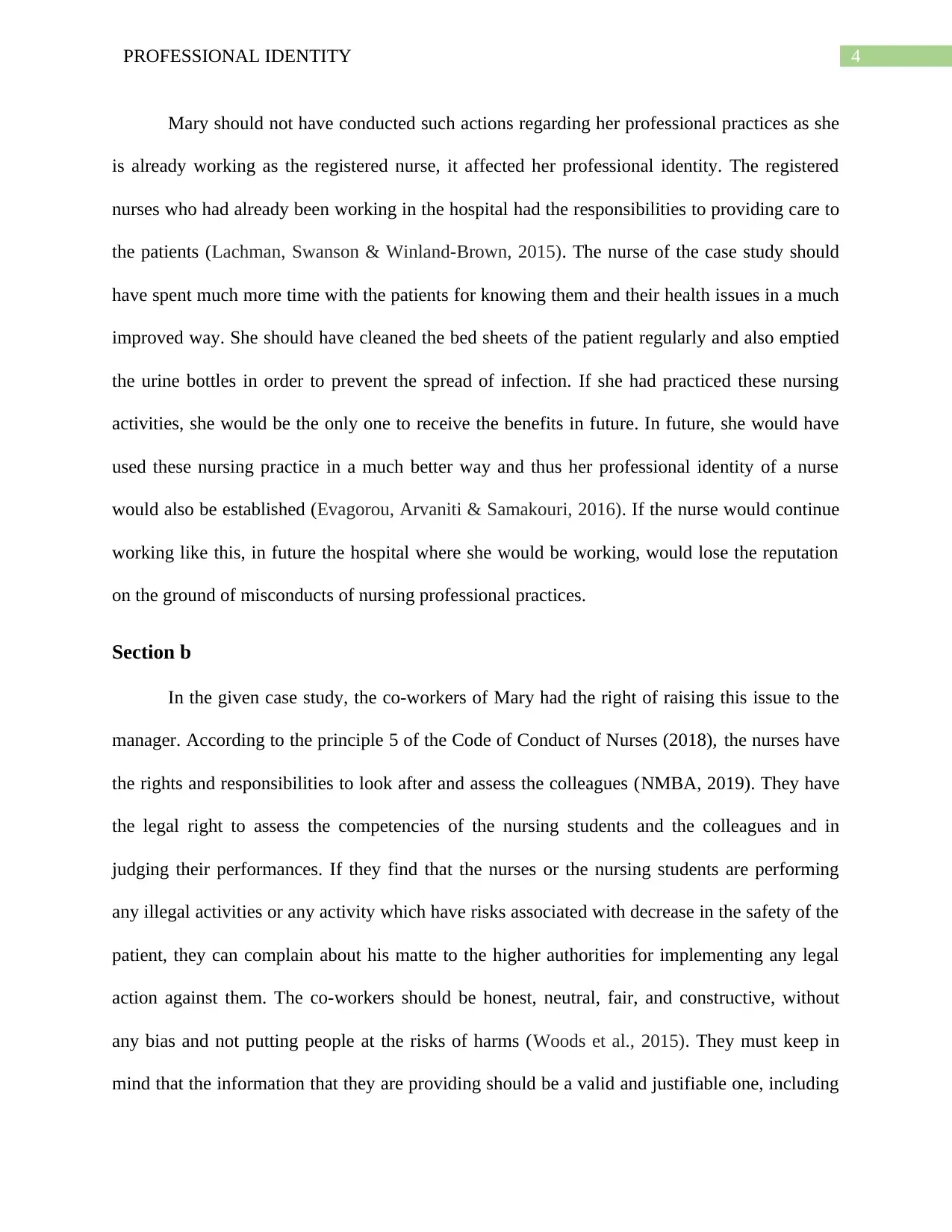
4PROFESSIONAL IDENTITY
Mary should not have conducted such actions regarding her professional practices as she
is already working as the registered nurse, it affected her professional identity. The registered
nurses who had already been working in the hospital had the responsibilities to providing care to
the patients (Lachman, Swanson & Winland-Brown, 2015). The nurse of the case study should
have spent much more time with the patients for knowing them and their health issues in a much
improved way. She should have cleaned the bed sheets of the patient regularly and also emptied
the urine bottles in order to prevent the spread of infection. If she had practiced these nursing
activities, she would be the only one to receive the benefits in future. In future, she would have
used these nursing practice in a much better way and thus her professional identity of a nurse
would also be established (Evagorou, Arvaniti & Samakouri, 2016). If the nurse would continue
working like this, in future the hospital where she would be working, would lose the reputation
on the ground of misconducts of nursing professional practices.
Section b
In the given case study, the co-workers of Mary had the right of raising this issue to the
manager. According to the principle 5 of the Code of Conduct of Nurses (2018), the nurses have
the rights and responsibilities to look after and assess the colleagues (NMBA, 2019). They have
the legal right to assess the competencies of the nursing students and the colleagues and in
judging their performances. If they find that the nurses or the nursing students are performing
any illegal activities or any activity which have risks associated with decrease in the safety of the
patient, they can complain about his matte to the higher authorities for implementing any legal
action against them. The co-workers should be honest, neutral, fair, and constructive, without
any bias and not putting people at the risks of harms (Woods et al., 2015). They must keep in
mind that the information that they are providing should be a valid and justifiable one, including
Mary should not have conducted such actions regarding her professional practices as she
is already working as the registered nurse, it affected her professional identity. The registered
nurses who had already been working in the hospital had the responsibilities to providing care to
the patients (Lachman, Swanson & Winland-Brown, 2015). The nurse of the case study should
have spent much more time with the patients for knowing them and their health issues in a much
improved way. She should have cleaned the bed sheets of the patient regularly and also emptied
the urine bottles in order to prevent the spread of infection. If she had practiced these nursing
activities, she would be the only one to receive the benefits in future. In future, she would have
used these nursing practice in a much better way and thus her professional identity of a nurse
would also be established (Evagorou, Arvaniti & Samakouri, 2016). If the nurse would continue
working like this, in future the hospital where she would be working, would lose the reputation
on the ground of misconducts of nursing professional practices.
Section b
In the given case study, the co-workers of Mary had the right of raising this issue to the
manager. According to the principle 5 of the Code of Conduct of Nurses (2018), the nurses have
the rights and responsibilities to look after and assess the colleagues (NMBA, 2019). They have
the legal right to assess the competencies of the nursing students and the colleagues and in
judging their performances. If they find that the nurses or the nursing students are performing
any illegal activities or any activity which have risks associated with decrease in the safety of the
patient, they can complain about his matte to the higher authorities for implementing any legal
action against them. The co-workers should be honest, neutral, fair, and constructive, without
any bias and not putting people at the risks of harms (Woods et al., 2015). They must keep in
mind that the information that they are providing should be a valid and justifiable one, including
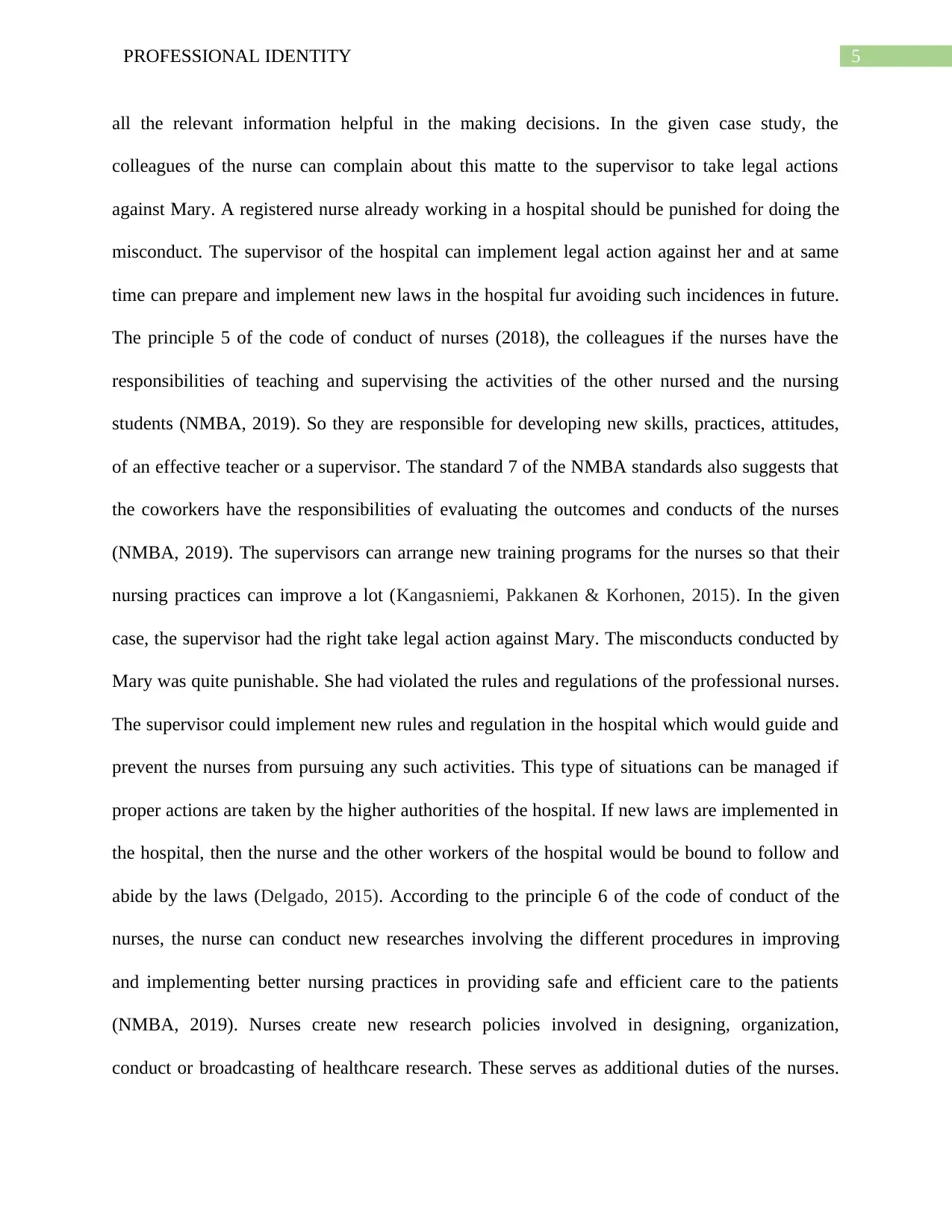
5PROFESSIONAL IDENTITY
all the relevant information helpful in the making decisions. In the given case study, the
colleagues of the nurse can complain about this matte to the supervisor to take legal actions
against Mary. A registered nurse already working in a hospital should be punished for doing the
misconduct. The supervisor of the hospital can implement legal action against her and at same
time can prepare and implement new laws in the hospital fur avoiding such incidences in future.
The principle 5 of the code of conduct of nurses (2018), the colleagues if the nurses have the
responsibilities of teaching and supervising the activities of the other nursed and the nursing
students (NMBA, 2019). So they are responsible for developing new skills, practices, attitudes,
of an effective teacher or a supervisor. The standard 7 of the NMBA standards also suggests that
the coworkers have the responsibilities of evaluating the outcomes and conducts of the nurses
(NMBA, 2019). The supervisors can arrange new training programs for the nurses so that their
nursing practices can improve a lot (Kangasniemi, Pakkanen & Korhonen, 2015). In the given
case, the supervisor had the right take legal action against Mary. The misconducts conducted by
Mary was quite punishable. She had violated the rules and regulations of the professional nurses.
The supervisor could implement new rules and regulation in the hospital which would guide and
prevent the nurses from pursuing any such activities. This type of situations can be managed if
proper actions are taken by the higher authorities of the hospital. If new laws are implemented in
the hospital, then the nurse and the other workers of the hospital would be bound to follow and
abide by the laws (Delgado, 2015). According to the principle 6 of the code of conduct of the
nurses, the nurse can conduct new researches involving the different procedures in improving
and implementing better nursing practices in providing safe and efficient care to the patients
(NMBA, 2019). Nurses create new research policies involved in designing, organization,
conduct or broadcasting of healthcare research. These serves as additional duties of the nurses.
all the relevant information helpful in the making decisions. In the given case study, the
colleagues of the nurse can complain about this matte to the supervisor to take legal actions
against Mary. A registered nurse already working in a hospital should be punished for doing the
misconduct. The supervisor of the hospital can implement legal action against her and at same
time can prepare and implement new laws in the hospital fur avoiding such incidences in future.
The principle 5 of the code of conduct of nurses (2018), the colleagues if the nurses have the
responsibilities of teaching and supervising the activities of the other nursed and the nursing
students (NMBA, 2019). So they are responsible for developing new skills, practices, attitudes,
of an effective teacher or a supervisor. The standard 7 of the NMBA standards also suggests that
the coworkers have the responsibilities of evaluating the outcomes and conducts of the nurses
(NMBA, 2019). The supervisors can arrange new training programs for the nurses so that their
nursing practices can improve a lot (Kangasniemi, Pakkanen & Korhonen, 2015). In the given
case, the supervisor had the right take legal action against Mary. The misconducts conducted by
Mary was quite punishable. She had violated the rules and regulations of the professional nurses.
The supervisor could implement new rules and regulation in the hospital which would guide and
prevent the nurses from pursuing any such activities. This type of situations can be managed if
proper actions are taken by the higher authorities of the hospital. If new laws are implemented in
the hospital, then the nurse and the other workers of the hospital would be bound to follow and
abide by the laws (Delgado, 2015). According to the principle 6 of the code of conduct of the
nurses, the nurse can conduct new researches involving the different procedures in improving
and implementing better nursing practices in providing safe and efficient care to the patients
(NMBA, 2019). Nurses create new research policies involved in designing, organization,
conduct or broadcasting of healthcare research. These serves as additional duties of the nurses.
⊘ This is a preview!⊘
Do you want full access?
Subscribe today to unlock all pages.

Trusted by 1+ million students worldwide
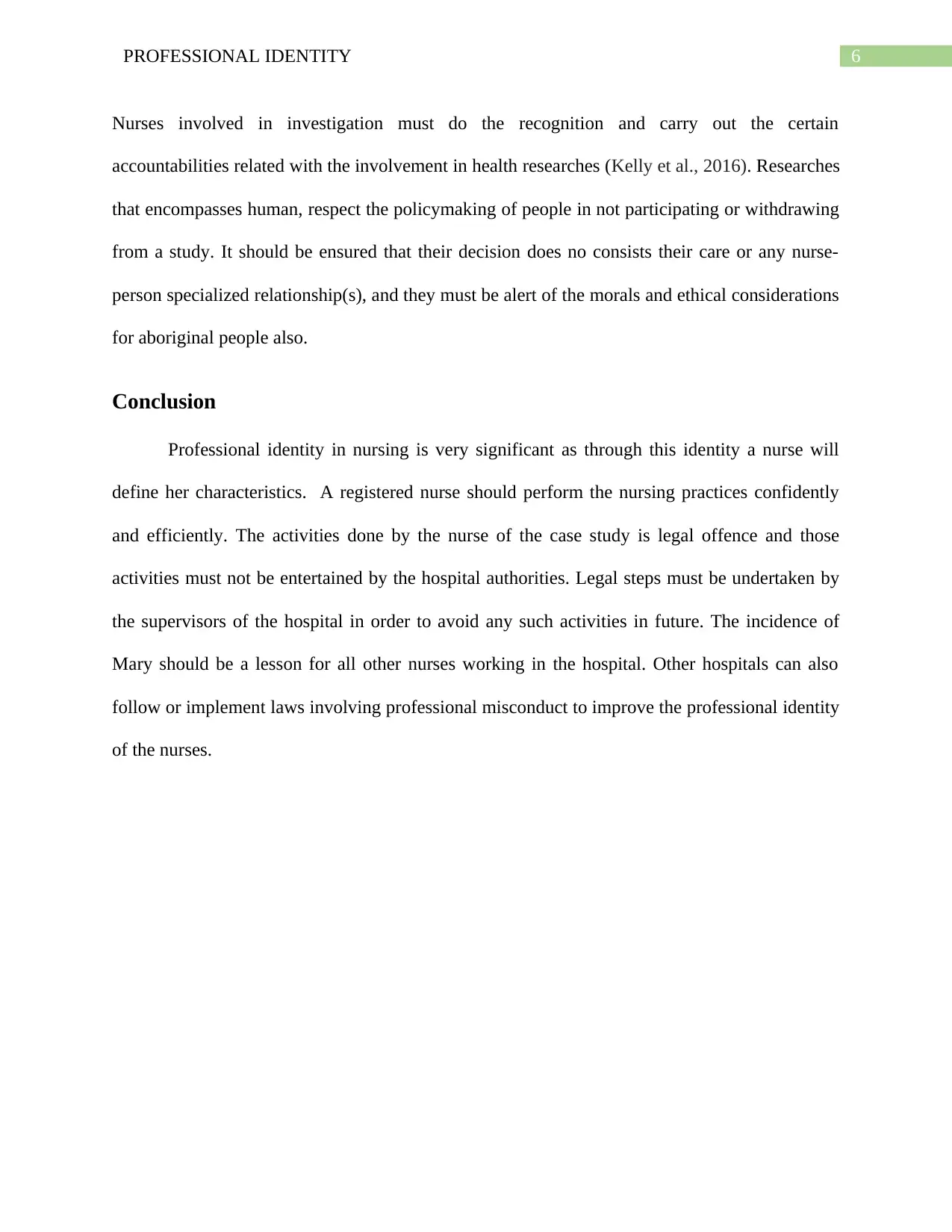
6PROFESSIONAL IDENTITY
Nurses involved in investigation must do the recognition and carry out the certain
accountabilities related with the involvement in health researches (Kelly et al., 2016). Researches
that encompasses human, respect the policymaking of people in not participating or withdrawing
from a study. It should be ensured that their decision does no consists their care or any nurse-
person specialized relationship(s), and they must be alert of the morals and ethical considerations
for aboriginal people also.
Conclusion
Professional identity in nursing is very significant as through this identity a nurse will
define her characteristics. A registered nurse should perform the nursing practices confidently
and efficiently. The activities done by the nurse of the case study is legal offence and those
activities must not be entertained by the hospital authorities. Legal steps must be undertaken by
the supervisors of the hospital in order to avoid any such activities in future. The incidence of
Mary should be a lesson for all other nurses working in the hospital. Other hospitals can also
follow or implement laws involving professional misconduct to improve the professional identity
of the nurses.
Nurses involved in investigation must do the recognition and carry out the certain
accountabilities related with the involvement in health researches (Kelly et al., 2016). Researches
that encompasses human, respect the policymaking of people in not participating or withdrawing
from a study. It should be ensured that their decision does no consists their care or any nurse-
person specialized relationship(s), and they must be alert of the morals and ethical considerations
for aboriginal people also.
Conclusion
Professional identity in nursing is very significant as through this identity a nurse will
define her characteristics. A registered nurse should perform the nursing practices confidently
and efficiently. The activities done by the nurse of the case study is legal offence and those
activities must not be entertained by the hospital authorities. Legal steps must be undertaken by
the supervisors of the hospital in order to avoid any such activities in future. The incidence of
Mary should be a lesson for all other nurses working in the hospital. Other hospitals can also
follow or implement laws involving professional misconduct to improve the professional identity
of the nurses.
Paraphrase This Document
Need a fresh take? Get an instant paraphrase of this document with our AI Paraphraser
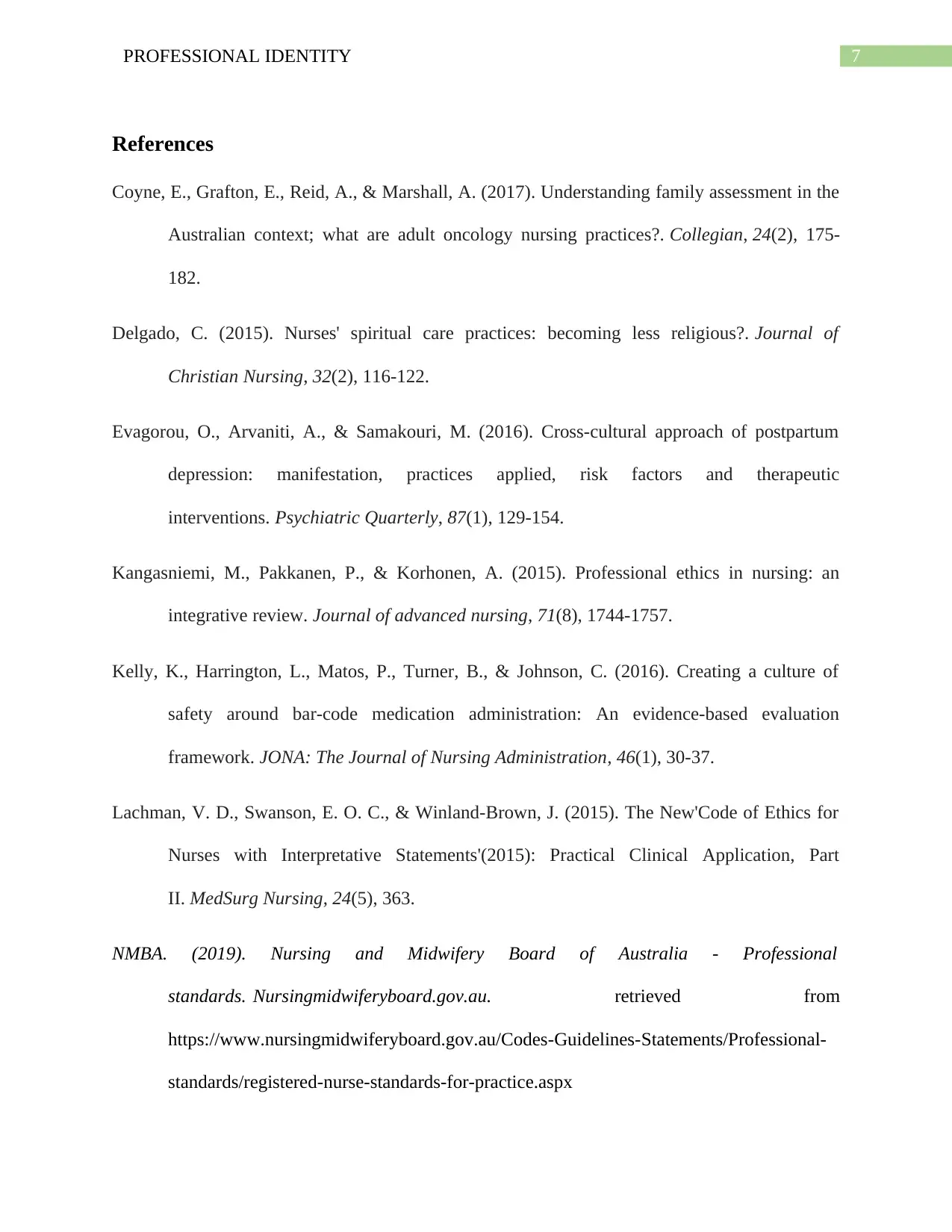
7PROFESSIONAL IDENTITY
References
Coyne, E., Grafton, E., Reid, A., & Marshall, A. (2017). Understanding family assessment in the
Australian context; what are adult oncology nursing practices?. Collegian, 24(2), 175-
182.
Delgado, C. (2015). Nurses' spiritual care practices: becoming less religious?. Journal of
Christian Nursing, 32(2), 116-122.
Evagorou, O., Arvaniti, A., & Samakouri, M. (2016). Cross-cultural approach of postpartum
depression: manifestation, practices applied, risk factors and therapeutic
interventions. Psychiatric Quarterly, 87(1), 129-154.
Kangasniemi, M., Pakkanen, P., & Korhonen, A. (2015). Professional ethics in nursing: an
integrative review. Journal of advanced nursing, 71(8), 1744-1757.
Kelly, K., Harrington, L., Matos, P., Turner, B., & Johnson, C. (2016). Creating a culture of
safety around bar-code medication administration: An evidence-based evaluation
framework. JONA: The Journal of Nursing Administration, 46(1), 30-37.
Lachman, V. D., Swanson, E. O. C., & Winland-Brown, J. (2015). The New'Code of Ethics for
Nurses with Interpretative Statements'(2015): Practical Clinical Application, Part
II. MedSurg Nursing, 24(5), 363.
NMBA. (2019). Nursing and Midwifery Board of Australia - Professional
standards. Nursingmidwiferyboard.gov.au. retrieved from
https://www.nursingmidwiferyboard.gov.au/Codes-Guidelines-Statements/Professional-
standards/registered-nurse-standards-for-practice.aspx
References
Coyne, E., Grafton, E., Reid, A., & Marshall, A. (2017). Understanding family assessment in the
Australian context; what are adult oncology nursing practices?. Collegian, 24(2), 175-
182.
Delgado, C. (2015). Nurses' spiritual care practices: becoming less religious?. Journal of
Christian Nursing, 32(2), 116-122.
Evagorou, O., Arvaniti, A., & Samakouri, M. (2016). Cross-cultural approach of postpartum
depression: manifestation, practices applied, risk factors and therapeutic
interventions. Psychiatric Quarterly, 87(1), 129-154.
Kangasniemi, M., Pakkanen, P., & Korhonen, A. (2015). Professional ethics in nursing: an
integrative review. Journal of advanced nursing, 71(8), 1744-1757.
Kelly, K., Harrington, L., Matos, P., Turner, B., & Johnson, C. (2016). Creating a culture of
safety around bar-code medication administration: An evidence-based evaluation
framework. JONA: The Journal of Nursing Administration, 46(1), 30-37.
Lachman, V. D., Swanson, E. O. C., & Winland-Brown, J. (2015). The New'Code of Ethics for
Nurses with Interpretative Statements'(2015): Practical Clinical Application, Part
II. MedSurg Nursing, 24(5), 363.
NMBA. (2019). Nursing and Midwifery Board of Australia - Professional
standards. Nursingmidwiferyboard.gov.au. retrieved from
https://www.nursingmidwiferyboard.gov.au/Codes-Guidelines-Statements/Professional-
standards/registered-nurse-standards-for-practice.aspx
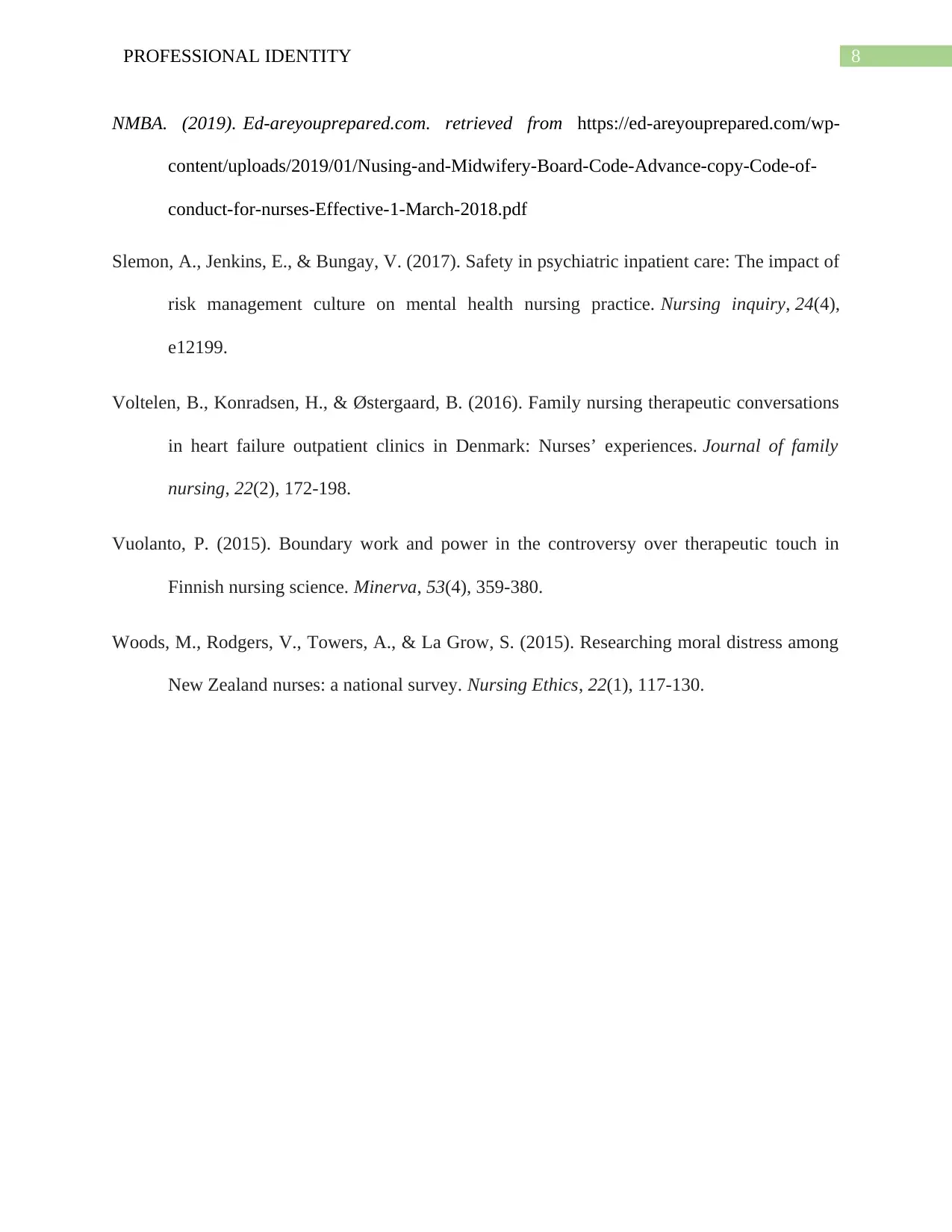
8PROFESSIONAL IDENTITY
NMBA. (2019). Ed-areyouprepared.com. retrieved from https://ed-areyouprepared.com/wp-
content/uploads/2019/01/Nusing-and-Midwifery-Board-Code-Advance-copy-Code-of-
conduct-for-nurses-Effective-1-March-2018.pdf
Slemon, A., Jenkins, E., & Bungay, V. (2017). Safety in psychiatric inpatient care: The impact of
risk management culture on mental health nursing practice. Nursing inquiry, 24(4),
e12199.
Voltelen, B., Konradsen, H., & Østergaard, B. (2016). Family nursing therapeutic conversations
in heart failure outpatient clinics in Denmark: Nurses’ experiences. Journal of family
nursing, 22(2), 172-198.
Vuolanto, P. (2015). Boundary work and power in the controversy over therapeutic touch in
Finnish nursing science. Minerva, 53(4), 359-380.
Woods, M., Rodgers, V., Towers, A., & La Grow, S. (2015). Researching moral distress among
New Zealand nurses: a national survey. Nursing Ethics, 22(1), 117-130.
NMBA. (2019). Ed-areyouprepared.com. retrieved from https://ed-areyouprepared.com/wp-
content/uploads/2019/01/Nusing-and-Midwifery-Board-Code-Advance-copy-Code-of-
conduct-for-nurses-Effective-1-March-2018.pdf
Slemon, A., Jenkins, E., & Bungay, V. (2017). Safety in psychiatric inpatient care: The impact of
risk management culture on mental health nursing practice. Nursing inquiry, 24(4),
e12199.
Voltelen, B., Konradsen, H., & Østergaard, B. (2016). Family nursing therapeutic conversations
in heart failure outpatient clinics in Denmark: Nurses’ experiences. Journal of family
nursing, 22(2), 172-198.
Vuolanto, P. (2015). Boundary work and power in the controversy over therapeutic touch in
Finnish nursing science. Minerva, 53(4), 359-380.
Woods, M., Rodgers, V., Towers, A., & La Grow, S. (2015). Researching moral distress among
New Zealand nurses: a national survey. Nursing Ethics, 22(1), 117-130.
⊘ This is a preview!⊘
Do you want full access?
Subscribe today to unlock all pages.

Trusted by 1+ million students worldwide
1 out of 9
Related Documents
Your All-in-One AI-Powered Toolkit for Academic Success.
+13062052269
info@desklib.com
Available 24*7 on WhatsApp / Email
![[object Object]](/_next/static/media/star-bottom.7253800d.svg)
Unlock your academic potential
Copyright © 2020–2025 A2Z Services. All Rights Reserved. Developed and managed by ZUCOL.




